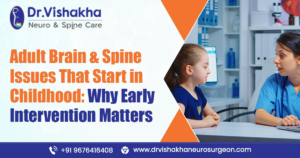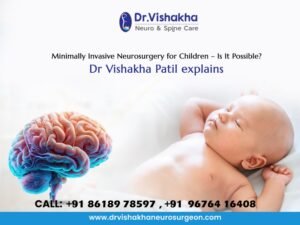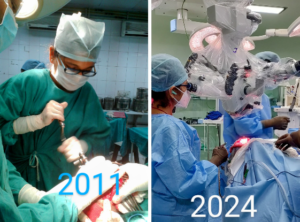With 18+ years of experience, I specialize in craniosynostosis surgery and have treated over 1,800 complicated cases. As one of the top pediatric neurosurgeons in Hyderabad, I provide complete patient care, including surgical intervention and family education on management regimens before and after surgery, at the best pediatric neurosurgery hospitals in Hyderabad.
Specialization of Dr Vishakha
Craniosynostosis is a condition where premature closure of skull sutures can affect the head shape and increase intracranial pressure. She also treats other pediatric neurosurgical conditions and brain and spinal disorders in children.
Dr. Vishakha’s Treatment Methodology
Craniosynostosis is a condition where a child’s skull bones fuse too early, causing abnormal head shapes and potential brain growth restrictions. Surgical intervention is the primary treatment, with the choice based on the child’s age, suture number, and condition severity. Minimally invasive endoscopic surgery is best for infants under 6 months old with single-suture Craniosynostosis, involving a small incision in the scalp and an endoscope to remove the fused suture. Helmet therapy is often required to reshape the skull as it grows. Open surgery offers smaller incisions, less scarring, less blood loss, shorter hospital stays, faster recovery, and lower risk of complications. Open cranial vault remodelling (CVR) surgery is suitable for infants over 6 months or those with multiple fused sutures, partially removing, reshaping, and repositioning the skull to allow normal brain growth. Types of open surgery include Strip Craniectomy, Total Cranial Vault Remodeling, and Front-orbital Advance (FOA). These methods are suitable for older infants and complex cases, do not require post-surgery helmet therapy, and are more effective for severe skull deformities.
Pre-surgical care for Craniosytosis
Fused sutures diagnosis involves clinical examination, imaging tests, and endoscopic surgery. Endoscopic surgery is recommended for infants under 6 months, while Open Cranial Vault Remodeling is recommended for older babies. Blood tests are crucial for haemoglobin levels and infection prevention. Anesthesia consultations assess risks, and blood transfusions may be necessary. Doctors advise against blood-thinning medications and ensure the baby is healthy and well-nourished before surgery.

Post-surgical care for Craniosynostosis
The surgery involves endoscopic and open cranial vault remodelling, with the baby monitored for complications in the ICU for 24 hours. Post-surgical symptoms include swelling, bruising, mild fever, sleepiness, and slight bleeding. Pain management involves medications like acetaminophen, ibuprofen, and stronger painkillers under hospital supervision. Cold compresses help with swelling. Maintain clean wounds and incisions, avoid direct water exposure, and check for infection signs. For endoscopic surgery, a custom-fitted helmet is needed, worn daily for several months and adjusted regularly by a specialist.
Follow-up appointments are scheduled 1-2 weeks after surgery, every 3-6 months for at least 1-2 years, and imaging tests (CT or MRI) are used to monitor skull growth.
Recovery times for craniosynostosis surgery patients vary based on surgery complexity and individual health status. Early detection of complications requires monitoring vital signs. Children may return to normal activities at different rates, and long-term follow-up is essential to address developmental or functional concerns post-surgery.
Dr. Vishakha’s Commitment to Patient Health and Well-being

Dr Vishakha is a leading specialist in the field known for her compassionate care, thorough communication with families, dedication to ethical practice, and patient education, ensuring a comprehensive understanding of treatment processes.
Dr. Vishakha Basavraj Karpe is a leading specialist in treating Craniosynostosis and related conditions in Hyderabad. With her extensive experience and patient-centred approach, she is a top choice for families seeking expert care. Recovery from surgery can be quick, but full recovery may take weeks to months, requiring regular follow-ups.
About Dr Vishakha:
Dr Vishakha is a highly skilled senior consultant at Rainbow Children’s Hospital in Banjara Hills and Hydernagar Hyderabad. She is known for her comprehensive care approach and is one of the few dedicated leading paediatric neurosurgeons in the city and India with over ten years of extensive experience in pediatric neurosurgery. Her expertise includes treating hydrocephalus, spinal dysraphism, craniosynostosis, paediatric brain infections, brain and spine tumours and stroke surgery.
She has a special interest in craniosynostosis surgery, which is done only in very few centres in India.
Proficiency of Dr Vishakha:
-
- Hydrocephalus (increased fluid in the brain): The procedure involves an endoscopic third ventriculostomy and CSF diversion (VP shunt) to treat complex hydrocephalus.
- Craniosynostosis (abnormal head shape due to untimely cranial sutures fusion) surgeries: Helmet therapy is a technique that is used in both endoscopic and open surgery.
- Spinal dysraphisms(Spina Bifida)- (spinal abnormalities present by birth) – surgical repair
- Encepahaocles repair surgery.
-
- Vascular conditions and stroke surgeries: revascularization surgeries for moya moya disease.
- Pediatric brain and spine tumour surgeries.
-
- Pediatric brain and spine infection surgeries: Endoscopic and open surgeries for brain and spine infections.
- Pediatric traumatic brain and spinal injury.
- Antenatal counselling for congenital fatal neurosurgical conditions.





